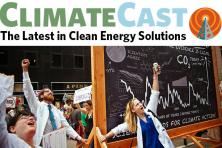Changing laws and filing lawsuits: how cities and states are leading the way
The Pacific Northwest continues to build clout as a clean energy leader. A Washington State House Committee just approved a proposal to implement a statewide low-carbon fuel standard, a law similar to policies Oregon and California already have in place to reduce greenhouse gas emissions in the transportation sector. The bill now heads to a fiscal committee for further review. In Oregon, a bill to limit and price pollution from top emitters has emerged as a major priority for the upcoming legislative session. Ten US states already have put a price on pollution, leading to many local clean energy investments. Richmond, California, home to several oil refineries and plants operated by Chevron, just became the ninth city to file suit against major fossil fuel companies over climate change, citing struggles with industrial pollution and the city’s bayside location, which makes it particularly vulnerable to climate impacts. A new survey shows that 68 percent of US mayors agree: cities should play a strong role in reducing the effects of climate change—even if it means sacrificing revenues or increasing expenditures.
Renewables: powering up and costing less
The International Renewable Energy Agency (IRENA) has released new numbers indicating that by 2020, electricity generated from renewables will be consistently cheaper than fossil fuels. Perhaps that’s why tech giants from Apple to Facebook are buying up more clean energy than ever before, either to directly power operations or to offset electricity consumption from non-renewable sources. And after an uncertain start, the US offshore wind market is finally picking up speed. More than 25 offshore wind projects are now being planned.
From Portland to Paris, and Riyadh to Round Rock, clean energy flexes its muscle
The French government has announced a ten-point plan to double the country’s wind power capacity by 2023, while Saudi Arabia is planning up to $7 billion in renewable energy projects this year. In Texas, solar power is ramping up and may soon displace fossil fuels as as a major source of summertime revenue for power generators. In Oregon, an unsuspecting power source is creating clean energy: electricity-generating turbines placed in water pipes. A startup project in Portland currently creates enough electricity to power 150 homes. Because it harnesses power through existing infrastructure, the project may hold promise for providing clean energy at a larger scale.
Drought, depression, anxiety and avalanches: the cruelties of climate change
Cape Town, South Africa is in crisis mode. Based on the City’s current water consumption and a three-year, once in a millennium drought, the city may run out of water in less than 90 days. Drought is causing problems elsewhere, too. Shrinking glaciers across the world are threatening the freshwater supply of downstream communities from the Himalayas to the Andes. In Texas, just months after Hurricane Harvey flooded the state, more than 40 percent of the state now finds itself grappling with moderate to severe drought. Drought has also transformed large swaths of the Sierra Nevada into “tree cemeteries”—which scientists say could create wildfires on a scale and intensity California has never seen before (quite the statement when you consider the mega-fires the state just experienced.)
Water scarcity isn’t only bringing forests to the brink, but entire countries too. Many believe Iran is “quickly approaching a breaking point,” as a lack of rainfall and warmer temperatures have lead to dust storms, disappearing lakes, and barren fields where crops once grew. Based on these recent headlines, it should come as no surprise that 2017 ranks as one of the hottest years on record—and 2017 wasn’t an El Niño year. Elsewhere, increased precipitation from climate change is causing problems; Tibet is experiencing a sharp uptick in avalanches. The increased rain and snow de-stabilizes area glaciers, making them more prone to collapse. Feeling depressed after reading all this? You’re not the only one; a new study on the mental health effects of climate change show that depression and anxiety commonly afflict Americans.
Stumbling blocks to progress
President Trump has issued a new 30% tariff on solar panel imports, a move projected to reduce utility-scale solar installations by as much as nine percent, and that could result in 23,000 jobs lost this year. A bipartisan group of more than 100 members of Congress issued a letter to President Trump urging him to recognize climate change as a national security threat. And the majority of members of the National Parks System Advisory Board have collectively resigned to protest the Trump administration’s policies that they say undermine environmental protections and that ignore science. It shouldn’t come as any surprise that, just one year into his administration, President Trump’s environmental agenda is thought to be taking a measurable toll; EPA pollution-control equipment and cleanup activity have dropped by more than 85% in the last year.
In brief: Calling on TriMet to step up for cleaner air
TriMet is Oregon’s largest transit agency, and the single largest purchaser of diesel fuel in the state. TriMet plans to introduce its first five electric buses this year, but has yet to commit to adding more electric buses to their 675-bus fleet. Electric buses reduce climate pollution, improve the quality of our air, and cost less to fuel and operate than a diesel bus.Climate Solutions urges TriMet to commit to transitioning their bus fleet to electric.





